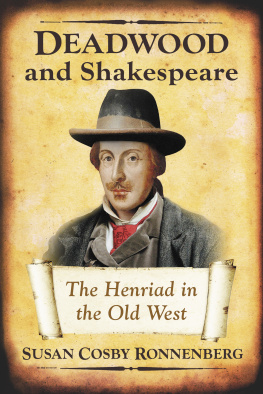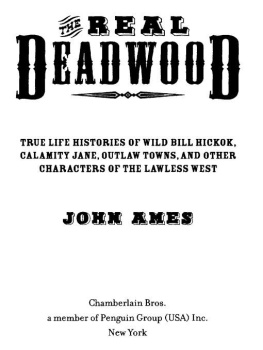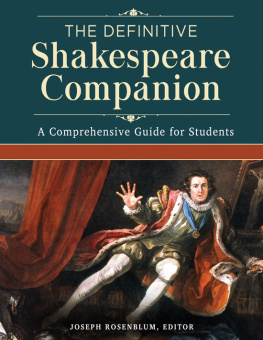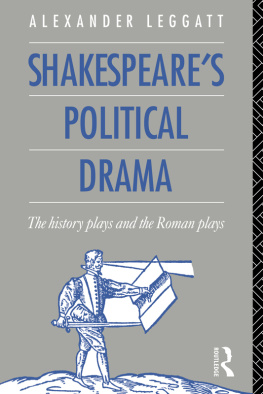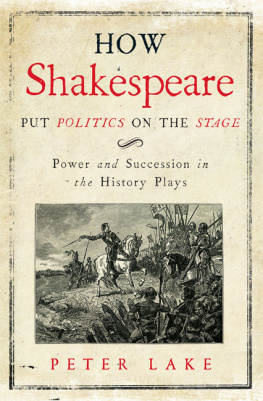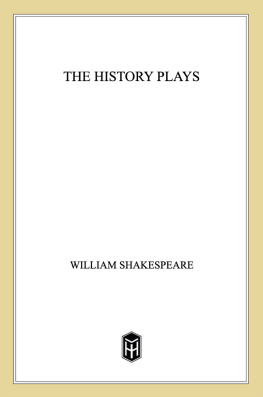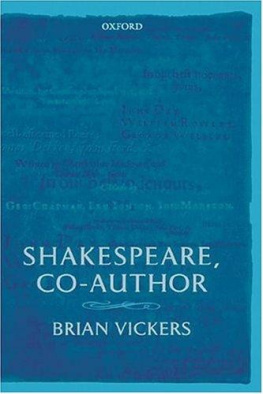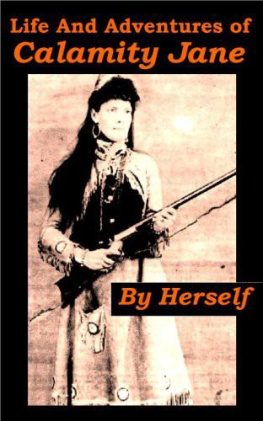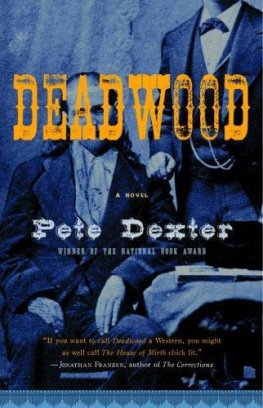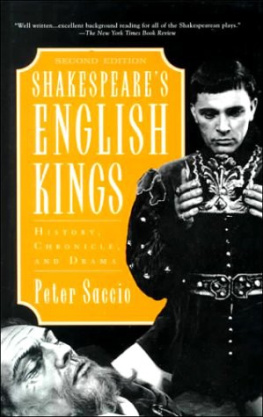
Deadwood and Shakespeare
The Henriad in the Old West
SUSAN COSBY RONNENBERG

McFarland & Company, Inc., Publishers
Jefferson, North Carolina
LIBRARY OF CONGRESS CATALOGUING DATA ARE AVAILABLE
BRITISH LIBRARY CATALOGUING DATA ARE AVAILABLE
e-ISBN: 978-1-4766-3095-3
2018 Susan Cosby Ronnenberg. All rights reserved
No part of this book may be reproduced or transmitted in any form or by any means, electronic or mechanical, including photocopying or recording, or by any information storage and retrieval system, without permission in writing from the publisher.
Front cover image based on the Flower portrait of William Shakespeare, circa 19th century (Royal Shakespeare Company)
McFarland & Company, Inc., Publishers
Box 611, Jefferson, North Carolina 28640
www.mcfarlandpub.com
For Clint, my Ellsworth, and Kate
Acknowledgments
This book would not exist without the encouragement and support of many people. I would like to especially thank Diana Stetler, Kelly Samuels, Kyle Jennings, and Ivy King for reading chapter drafts at various stages and providing feedback, along with encouragement.
Portions of Chapters 1, 2, 3, and 4 were presented, in a very condensed single paper version, at the 2010 National Popular Culture Association conference, with a focus on only 1 Henry IV parallels to Deadwood. That draft was reviewed by Kelly Samuels and Rolf Samuels, who provided very detailed and useful feedback that ultimately led to the book proposal.
Thank you to Viterbo Universitys Faculty Development Grant program, which supported my continued attendance and participation in the National Popular Culture Association conference and the Midwest Popular Culture Association conference.
Thanks to Justin Charron for the year-long conversations on the value of comparing texts, which helped with both of our projects.
Thanks, too, to friends and family for offering unwavering and enthusiastic support for the development of this project, especially Clint Ronnenberg, my Hendrix College Labor-Day-Weekends alum group, and the S.F.S.G. I cannot convey how much your excitement over this work helped me complete it.
Finally, Ive never been so glad that my parents shared their love of John Wayne and John Ford films with me during my childhood, which my sister balanced out with her love of Shakespeare.
Preface
HBOs critically-acclaimed Western series Deadwood was cancelled in 2006, but interest in the show has continued with its viewership consistently increasing, thanks to its streaming access and marathon television airings in recent years. In 2014, articles appeared on Slate, Slant, Yahoo, Mental Floss, UpRoxx, and Television observing the tenth anniversary of the series premiere. The year 2016 marked the tenth anniversary of the series cancellation and another round of accolades and analyses about the show and the possibility of reviving it in some form. In January 2016, HBO greenlit script development from the series creator, David Milch, for one to two television movies to return to Deadwoods incomplete narrative arcs. The show has been ranked in the top ten dramatic television series by a number of television critics and media sites, including IndieWires list of The 25 Best TV Dramas Since The Sopranos, from February 2016, which lists Deadwood at number two, second only to The Wire.
Ten books and numerous articles published since the series endedpromoting the show and analyzing aspects of itreflect continuing critical and popular interest in the drama. Obviously, these texts focus on a broad range of topics related to HBOs Deadwood series, with an emphasis on its use of violence and profanity, gender roles, and disability studies, as well as how it adheres to or challenges the conventions of the Western in literature, film, and television. Several studies, such as Alan Sepinwalls The Revolution was Televised (2013) and Kim Akass and Janet McCabes Quality TV: Contemporary American Television and Beyond (2007), also include Deadwood and Milch as part of the American television revolution brought about by cable networks at the beginning of the 21st century. A few articles examine how historical figures and events, as well as cultural practices, of the real 19th century Deadwood are portrayed. Several articles address the extraordinary mixing of language, both high and low, in the series; many reference Shakespeare or Dickens for comparison, but do so only vaguely, with a nod to the influence of these textsspecifically the soliloquy and the dramatic monologueand the language of the Bible in characters dialogue on a regular basis.
None of the articles or books on Deadwood offer concrete comparisons between specific aspects of William Shakespeares plays and the television series, however. While I enjoyed the extraordinary language play on the series, I was struck by how Seth Bullocks admirable qualities were offset by his intense and frequent anger, which often manifested in out-of-control violence. He reminded me of Hotspur from 1 Henry IV, who has a similar problem; once I saw this association, I couldnt unsee it. The goal of this book is to explore correspondences between William Shakespeares first set of history plays, consisting of Richard II, 1 Henry IV, 2 Henry IV, and Henry V, and the Western series Deadwood.
Other character parallels also seemed to fit; the other male lead character, Al Swearengen, shares a few traits in common with Falstaff and Henry IV, also in 1 Henry IV. This character alignment then readily lent itself to looking at the relationship between Bullock and Swearengen through the lens of the son- and father-figure relationships of Prince Hal/Hotspur and Falstaff/Henry IV in 1 Henry IV. I presented a paper on this subject at the National Popular Culture Associations conference in 2010 as part of an excellent Masculinity Studies on Television panel; the positive response it received encouraged me to continue expanding the study to other plays in the tetralogy, starting with 2 Henry IV and Richard II. At the time, few of the Deadwood studies explicitly addressed in-depth the nature of the father-son relationship that emerges between Deadwoods chief protagonists, Al Swearengen and Seth Bullock.
The unusual structure of Richard II is paralleled in Deadwoodparticularly in relation to how the audiences response to Swearengen shifts as the series progresses. Few of the studies of the HBO series analyze the structure of the series regarding opening and closing framing shots, how the camera directs our attention to specific details in its sharpening focus, and how the juxtaposition of locations tells us something about the relationship between characters and events unfolding in the series. Like Deadwood, the Henriad emphasizes communities dealing with internal versus external threats, the creation of a unified community under threat, and the role of women, marginalized as they are in this set of history plays and, to a lesser degree, on the Deadwood series. Finally, studies on the Western genre in film for comparison with conventions of Shakespeares history sub-genre offered a surprising number of similarities for further analysis, including a focus on father-son relationships and the marginalization of women. Both sets of work contain structural devices that disrupt the narrative to direct audience attention; Rumor, Epilogue, and the Chorus directly address the audience in
Next page
